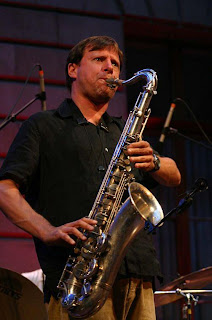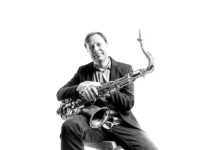Chris Potter has long been one of my favorite saxophonists simply by virtue of playing in a couple of my favorite bands. As a former long-time member of The Dave Holland Quintet and the reconstituted Steely Dan, Potter made his name while in his twenties with some of the most discerning types in the business (Paul Motian, Dave Douglas and Herbie Hancock thought that highly of him, too, by the way). Potter’s rangy, high-nuanced style not only made him a natural in such assorted settings, but it also meant that he was destined to more than simply regurgitate other people’s music and establish his own boundary-pushing music.
With a nice bundle of widely-acclaimed modern jazz albums already under his belt, Potter started to move beyond post-bop around 2002, and made his left turn move with the release of Underground in 2006. There, he assembled a band composing of Wayne Krantz on guitar, Craig Taborn on Rhodes and Nate Smith on drums. The structure of the songs often didn’t follow bop conventions, and he even covered songs by acts like Radiohead and the Beatles, as if the drive home that point. But there weren’t anything simple and straight about these songs and how he arranged them. That was followed the next year by the live-at-the-Village-Vanguard Follow The Red Line, with Krantz replaced by Adam Rogers. There, Potter and his crew moved into funk territory, but with his grand sense of harmonic intellect intact. Despite limited listens, that was good enough to make a year-end list of ours for 2007.
After the diversion Song For Anyone, Potter returns with his Red Line line-up for Ultrahang. It’s a continuation along the path Potter set out on with Underground and progressed further with Follow The Red Line. The material from that live set benefited plenty from the energy they get from playing in front of crowd, but the leader wanted to be even more “in the moment” than that. And he wanted to accomplish that without sacrificing risk-taking and an intellectual edge. In his own words, Potter was looking to play “serious, exploratory music that could be unpretentious and fun.”
That wouldn’t seem possible, but Potter discovered a clever way of squeezing more spontaneity out of his group: by shaping songs from their sound check practice jams. He began taping those extemporaneous sessions and arranging them into discrete songs. The deep grooves are retained and the unpredictable changes are fleshed out.
When thinking of bop saxophonists of Potter’s generation taking a plunge into groove oriented, organic funk-fusion, Joshua Redman’s recent Elastic Band excursion come to mind. But as good as Redman’s combo was in exploiting that groove, there was a certain restraint that kept the band from bursting out into the unknown. Not the case for Potter’s group. If you hadn’t picked up on this earlier, there is no bass player in his band. Just as an organ player is often called upon to provide the bottom through his bass pedals, Taborn is carrying that load on his Rhodes. He gets the job done mostly by not trying too hard at it; there’s no force-feeding of low notes from his electric piano, he hits those keys when it feels right to do it. The space left over puts a layer of air between the drums and the other instruments that keeps the funk light and nimble.
The other distinction of Potter is that these melodies are harmonically challenging, more so than his previous fusion records. There are times he’s flirting with avant garde. Even when he isn’t, songs can abruptly change direction, consist of odd changes, or negotiate with shifting time signatures.
“Ultrahand,” the song serves notice that Potter is using the occasion of this album to push his art further outward. He creates knotty melodic lines seemingly out of thin air, using a sparse foundation of occasional key changes. Smith settles into a peculiar, loping rhythm he could probably patent. And Rogers’ snarling blues guitar, whether following Potter’s twisted lines or playing counter statements, adds a street tough element to the sonic detail that Miles was reaching for when made all those genre-shaping fusion record in the early seventies.
One of the most successful attempts at making a difficult and multi-phased extended piece urgent and irresistibly funky has got to be “Facing East.” It’s a ten-minute odyssey of textural passages and down to the bone funk. The frenetic pace of “Rumples” sets the tone for the back-breaking, atonal unison lines of Potter and Rogers, before Rogers breaks off into an acerbic solo.
Right in the middle of this forceful set comes a quiet delivery of Bob Dylan’s 1964 classic tune “It Ain’t Me, Babe.” Potter conjures up a such convincing, velvet tone from his bass clarinet in the first verses, he forces you to look at the instrument in a different light. Switching horns, he and the backing band rise to a higher volume in measured steps, and the tenor maintains its grace as it moves into more passionate phrases.
“Time’s Arrow” is a showcase of sorts for Taborn, who in addition to subtly holding down a bass line, alternately softens the edge of the sound and toughens it up. Here, he articulates with legato phrasing and with great rhythmic sense. The mid-tempo funk of “Small Wonder” gives Rogers a chance to stretch out on the rock side, and he does so with note bending proficiency.
And then there’s “Boots,” a ten minute jam that starts with Smith’s assertive beat that stops, stutters and rolls at random junctures to add flair to Potter’s and Rogers’ solos, before going off into a funk-filled solo of his own. By contrast, the closer “Interstellar Signals” just floats along, fueled by mood and textures, and nearly collapsing into chaos before asserting itself and bringing resolution to the fragments presented throughout the song.
With a perfect mixture of the energy expended for a live performance and the freewheeling attitude of a warm up jam combined with the sound fidelity of the studio, Ultrahang is probably a pretty accurate realization of Chris Potter’s incisive vision. With such cohesive and sharp performances from these four the last few records with increasing returns each go around, I need
to add another band to my list of Potter-affiliated favorites: Potter’s own quartet.
Ultrahang is Chris Potter’s first ArtistShare release, and went on sale July 1.
- Christian Marien Quartett – ‘How Long Is Now’ (2024) - April 18, 2024
- Dave Douglas, feat. James Brandon Lewis – ‘Gifts’ (2024) - April 11, 2024
- Thollem – ‘Worlds In A Life, Two’ (2024) - April 8, 2024




